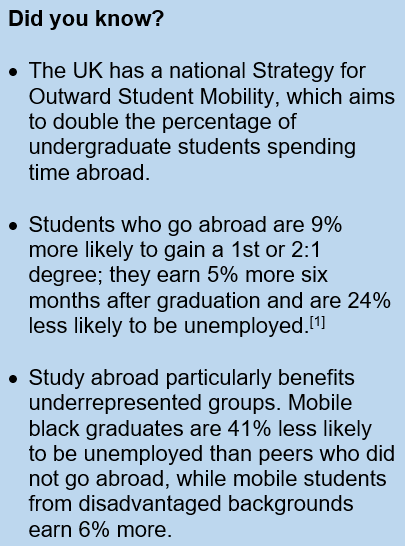Researchers: How to use your global networks to benefit students
By By Guest Blogger, on 25 January 2019
By Victoria Shaw, Strategic Programme Manager, UCL Global Engagement Office
 UCL’s Global Engagement Strategy sets out the goal for 30% of our undergraduate student body to have an international experience as part of their degree programme by 2020. This reflects a growing body of evidence that study and work abroad leads to better degrees and better jobs.
UCL’s Global Engagement Strategy sets out the goal for 30% of our undergraduate student body to have an international experience as part of their degree programme by 2020. This reflects a growing body of evidence that study and work abroad leads to better degrees and better jobs.
UCL is home to one of the UK’s most international academic communities and researchers travel all over the world to build networks and partnerships. So how can globally engaged academics use their connections to further inbound and outbound student mobility?
Short-term global opportunities
Demand for short-term global opportunities is accelerating among undergraduates worldwide and UCL students are no exception.
In 2017/18, UCL Study Abroad supported 306 students for short-term mobilities, a 115% increase on the previous year. Students took up a variety of opportunities, ranging from research on howler monkeys in Mexico to the study of Chinese language and culture in Shanghai.
“Given the interest in and clear appetite for short-term opportunities, we are working to expand this exciting area,” says Owain Evans, Short Mobilities Coordinator.
“If academic colleagues learn of interesting international summer schools, research or volunteering opportunities while visiting partner institutions or through conversations with collaborators, please get in touch – we’d love to hear more and explore new options for UCL students.”
Current summer schools, research placements and other openings can be viewed on the Short-Term Global Opportunities web page, along with information on UCL’s Global Experience Bursary, which provides financial support for students.
UCL Summer School
UCL’s own Summer School has grown rapidly since its launch in 2016 and receives outstanding feedback on the experience it provides for students.
Last year, students attended from over 240 universities, attracted to the small group teaching and wide choice of modules. Students can apply individually or under an institutional agreement, and many use it as a stepping stone to postgraduate study.
“Academic staff have great connections and play an important part in promoting the Summer School internationally,” says Rhod Fiorini, Head of Programme.
The Summer School team can provide publicity materials for UCL staff wishing to promote the programme and explore group discounts for partners.
Global internships
Scholars with links to companies and NGOs abroad should be aware that UCL Careers is seeking international internships for UCL students.
“Organisations around the world are increasingly seeking graduates who are adaptable, curious and resilient,” says Rhiannon Williams, Global Internships Manager.
“An internship abroad helps students develop these skills whilst kick-starting their global careers. It also allows employers to create a pipeline of globally-minded talent for their business, particularly valuable if they are looking to expand into new markets.”
Last year, 76 students visited over 25 different countries as part of the Global Internships Programme.
If academic staff make a referral, UCL Careers will work with the organisation to identify internships, advertise them to students and shortlist applicants.
UCL has secured Erasmus+ funding, managed jointly by Careers and Study Abroad, for students undertaking positions within the EU, making this a particularly desirable destination for new internships.
Contacts
For more information or to discuss proposals:
- Short-term Global Opportunities: Owain Evans, Short Mobilities Coordinator (o.evans@ucl.ac.uk)
- UCL Summer School: Rhod Fiorini, Head of the UCL Summer School (r.fiorini@ucl.ac.uk)
- Global Internships: Rhiannon Williams, Global Internships Manager (rhiannon.e.williams@ucl.ac.uk)
 Close
Close


